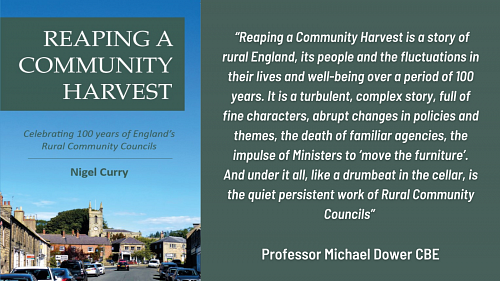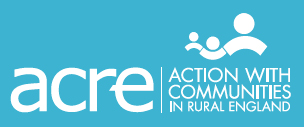Reaping a Community Harvest – a history of support for England’s rural communities
New book chronicles the origins, achievements, tribulations, and current day circumstances of ACRE Network members.
On the 8th of October 1920, a small group of academics from the University of Oxford set up Oxfordshire Rural Community Council as a platform for promoting social reform in the villages surrounding the city. It was to become a model for another 37 county-based, charitable development agencies which today make up the ACRE Network.
‘Reaping a Community Harvest’ by Professor Nigel Curry is being published today alongside a celebration of 100 years of support for England’s village halls.
The book is a story of the people, ideas and organisations behind the numerous initiatives and schemes developed over the years to improve the lot of folk living and working in the countryside.
Stories like Essex Rural Community Council who in the 1930s pioneered a mobile cinema service from the back of a car whilst running a ‘reconditioning camp’ on Osea Island to help unemployed men improve their fitness ready for a return to work. And the more niche Hop Pickers Medical Care Treatment Board operated by Kent Rural Community Council in the same period.
Whilst the work of these county-based rural charities has been diverse, some concerns and schemes have been a constant; providing leisure opportunities through village halls, supporting rural businesses and helping people into employment, as well as a perennial concern about what gets built where.
The publication also provides insight into the current day circumstances of the ACRE Network such as a more recent focus on renewable energy installations and support for community businesses. And how these same organisations responded to Covid-19; supporting good neighbour schemes country-wide, distributing Grow Your Own seed packs in Northumberland, offering free coffee to key workers in Leicestershire & Rutland and a scheme called Operation Pen Pal in Lincolnshire which encouraged rural youngsters to write to older people in their community without even knowing them.
Professor Michael Dower CBE who provides the foreword to the book says, “It is a story of rural England, its people and the fluctuations in their lives and well-being over a period of 100 years. It is a turbulent, complex story, full of fine characters, abrupt changes in policies and themes, the death of familiar agencies, the impulse of Ministers to ‘move the furniture’. And under it all, like a drumbeat in the cellar, is the quiet persistent work of Rural Community Councils”.
Phillip Vincent, ACRE’s Communications and Public Affairs Manager said: “We are pleased to support the publication of this book as it provides an important historical record of the ACRE Network. The names of the organisations involved may have changed, but our network remains as focused as ever on making the countryside a better place to live and work.”
The book is available to purchase from ACRE for £10 plus postage and can be ordered here.
ENDS



